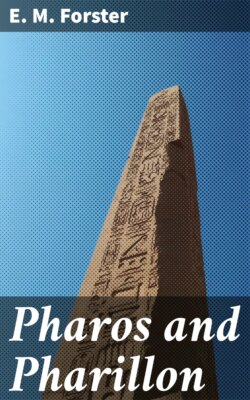Читать книгу Pharos and Pharillon - E. M. Forster - Страница 5
На сайте Литреса книга снята с продажи.
I
ОглавлениеTable of Contents
The career of Menelaus was a series of small mishaps. It was after he had lost Helen, and indeed after he had recovered her and was returning from Troy, that a breeze arose from the north-west and obliged him to take refuge upon a desert island. It was of limestone, close to the African coast, and to the estuary though not to the exit of the Nile, and it was protected from the Mediterranean by an outer barrier of reefs. Here he remained for twenty days, in no danger, but in high discomfort, for the accommodation was insufficient for the Queen. Helen had been to Egypt ten years before, under the larger guidance of Paris, and she could not but remark that there was nothing to see upon the island and nothing to eat and that its beaches were infested with seals. Action must be taken, Menelaus decided. He sought the sky and sea, and chancing at last to apprehend an old man he addressed to him the following wingèd word:
“What island is this?”
“Pharaoh’s,” the old man replied.
“Pharos?”
“Yes, Pharaoh’s, Prouti’s”—Prouti being another title (it occurs in the hieroglyphs) for the Egyptian king.
“Proteus?”
“Yes.”
As soon as Menelaus had got everything wrong, the wind changed and he returned to Greece with news of an island named Pharos whose old man was called Proteus and whose beaches were infested with nymphs. Under such misapprehensions did it enter our geography.
Pharos was hammer-headed, and long before Menelaus landed some unknown power—Cretan—Atlantean—had fastened a harbour against its western promontory. To the golden-haired king, as to us, the works of that harbour showed only as ochreous patches and lines beneath the dancing waves, for the island has always been sinking, and the quays, jetties, and double breakwater of its pre-historic port can only be touched by the swimmer now. Already was their existence forgotten, and it was on the other promontory—the eastern—that the sun of history arose, never to set. Alexander the Great came here. Philhellene, he proposed to build a Greek city upon Pharos. But the ridge of an island proved too narrow a site for his ambition, and the new city was finally built upon the opposing coast—Alexandria. Pharos, tethered to Alexandria by a long causeway, became part of a larger scheme and only once re-entered Alexander’s mind: he thought of it at the death of Hephæstion, as he thought of all holy or delectable spots, and he arranged that upon its distant shore a shrine should commemorate his friend, and reverberate the grief that had convulsed Ecbatana and Babylon.
Meanwhile the Jews had been attentive. They, too, liked delectable spots. Deeply as they were devoted to Jehovah, they had ever felt it their duty to leave his city when they could, and as soon as Alexandria began to develop they descended upon her markets with polite cries. They found so much to do that they decided against returning to Jerusalem, and met so many Greeks that they forgot how to speak Hebrew. They speculated in theology and grain, they lent money to Ptolemy the second king, and filled him (they tell us) with such enthusiasm for their religion that he commanded them to translate their Scriptures for their own benefit. He himself selected the translators, and assigned for their labours the island of Pharos because it was less noisy than the mainland. Here he shut up seventy rabbis in seventy huts, whence in an incredibly short time they emerged with seventy identical translations of the Bible. Everything corresponded. Even when they slipped they made seventy slips, and Greek literature was at last enriched by the possession of an inspired book. It was left to later generations to pry into Jehovah’s scholarship and to deduce that the Septuagint translation must have extended over a long period and not have reached completion till 100 B.C. The Jews of Alexandria knew no such doubts. Every year they made holiday on Pharos in remembrance of the miracle, and built little booths along the beaches where Helen had once shuddered at the seals. The island became a second Sinai whose moderate thunders thrilled the philosophic world. A translation, even when it is the work of God, is never as intimidating as an original; and the unknown author of the “Wisdom of Solomon” shows, in his delicious but dubious numbers, how unalarming even an original could be when it was composed at Alexandria:
Let us enjoy the good things that are present, and let us speedily use the creatures like as in youth.
Let us fill ourselves with costly wine and ointments, and let no flower of the spring pass by us.
Let us crown ourselves with rose-buds before they are withered.
Let none of us go without his part in our voluptuousness, let us leave tokens of our joyfulness in every place, for this is our portion and our lot is this.
It is true that, pulling himself together, the writer goes on to remind us that the above remarks are no elegy on Alexander and Hephæstion, but an indictment of the ungodly, and must be read sarcastically.
Such things they did imagine and were deceived, for their own wickedness hath blinded them.
As for the mysteries of God they knew them not, neither hoped they for the wages of righteousness nor discerned a reward for blameless souls.
For God created man to be immortal, and made him to be the image of his own eternity.
But it is too late. And all racial and religious effort was too late. Though Pharos was not to be Greek it was not to be Hebrew either. A more impartial power dominated it. Five hundred feet above all shrines and huts, Science had already raised her throne.
